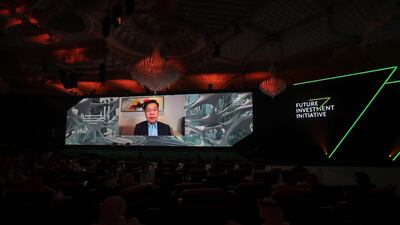Artificial intelligence has "advanced phenomenally" within the past three years and could replace most routine tasks, but needs to be regulated to ensure it benefits society, a leading group of investors told a panel at Saudi Arabia's Future Investment Initiative.
"AI is now able to see and recognise at the same or higher quality than people ... [it] has beaten people in all kinds of tasks," Dr. Kai-Fu Lee, chairman and chief executive of Beijing-based venture capital company Sinovation Ventures, said on Thursday.
"It's really gone faster than anyone would have anticipated. I've worked in the field for 40 years, and it's been in anticipation for the first 36 and the last four years has been truly a rollercoaster ride," Dr Lee added.
AI is "the greatest technology evolution that mankind ever created", Masayoshi Son, chairman and chief executive of Japanese technology investor Softbank, said.
Currently eight out of the world's ten most valuable companies are internet-related, Mr Son said, but the internet has only truly disrupted two industries - advertising and retail. The former makes up about 1 per cent of the world's gross domestic product and the latter accounts for 10 per cent.
"So the remaining almost 90 per cent of GDP is everything else - like housing, transportation, logisticals, medical, education, healthcare and so on. All of those industries that were not revolutionised by internet yet would be revolutionised by the power of AI," he said. Intelligent medicines could cure cancers and gene editing could help to end other diseases, he added.
"From now on, to the next 20 or 30 years the most remarkable developments will be coming."
Steven Schwarzmann, chairman and chief executive of Blackstone Group, the world's third-largest alternative asset manager, warned that AI needs to be properly regulated.
Mr Schwarzmann, who has donated to AI ethics centres at Oxford University and the Massachusetts Institute of Technology, said the issues around the adoption of AI are "so powerful, so wide ranging, they're going to affect everyone in society - either directly or indirectly".
"So you have to have some set of rules or principles so that this gets applied in a way that's good for human beings. That won't necessarily happen if you just let it happen."
A new Global AI Action Alliance body made up of more than 100 companies, government and civil society organisations was formed by the World Economic Forum as part of its Davos Agenda event on Thursday.
It said although AI has the potential to make organisations 40 per cent more efficient by 2035, unlocking some $14 trillion in economic value, recent controversies regarding facial recognition, automated decision-making and Covid-19 tracking have shown there are risks posed by unsafe or unethical AI systems.
Mr Schwarzmann said "almost every entity of signifcance of this world" is currently grappling with the question of ethical AI, including the Organisation for Economic Co-operation and Development, the G7, the European Union and others.
"Ultimately, there's going to have to be some congruence of what different countries are thinking with a set of principles or a compact," he said.
"We sort of blew it with the internet. That's sort-of gone, more or less," he added, in terms of being able to control the potentially disruptive effects it has.


